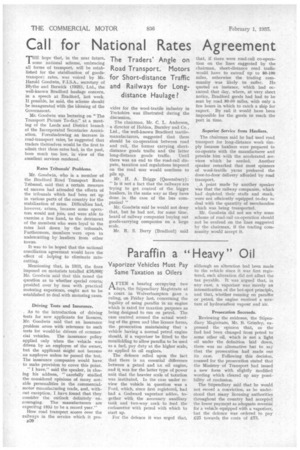Call for National Rates
Page 30

If you've noticed an error in this article please click here to report it so we can fix it.
THE hope that, in the near future, some national scheme, embracing all forms of transport. will be established for the stabilization of goodstranspor.: rates, was voiced by Mr. Harold Goodwin, F.I.S.A., secretary of Blythe and Berwick (1928), Ltd., the well-known Bradford haulage concern, in a speech at Bradford, last week. If possible, he said, the scheme should be inaugurated with the blessing of the Government.
Mr. Goodwin was lecturing on "The Transport Picture To-day," at a meet ing of the Leeds and District branch of the Incorporated Secretaries Association. Foreshadowing an increase in road-transport rates, he suggested that traders themselves would be the first to admit that these rates had, in the past, been much too low, in view of the excellent services rendered.
Rates Tribunals' Problems.
Mr. Goodwin, who is a member of the Bradford Road Transport Rates Tribunal, said that a certain measure of success had attended the efforts of the tribunals which had been set up in various parts of the country for the stabilization of rates. Difficulties had, however, arisen, because some operators would not join, and were able to exercise a free hand, to the detriment of the members who were loyal to the rates laid down by the tribunals. Furthermore, members were open to undercutting by hauliers from other towns.
It was to be hoped that the national conciliation agreement would have the effect of helping to eliminate ratecutting.
Mentioning that, in 1933, the fines imposed on motorists totalled £16,000; Mr. Goodwin said that this raised the question as to whether special courts; presided over by men with practical motoring experience, ought not to be established to deal with motoring cases.
Driving Tests and Insurance.
, As to the introduction of driving tests for new applicants for licences, Mr. Goodwin said that an insurance problem arose with reference to such tests for would-be drivers of commercial vehicles. The insurance policy applied only when the vehicle was driven by an employee of the owner, but the applicant might not become an employee unless he passed the• test. The insurance companies would have to make provision to cover this point.
"I have," said the speaker, in closing his address, "carefully studied the considered opinions of many notable personalities in the commercialmotor manufacturing trade, and, without exception. I have found that they consider the outlook definitely encouraging. The manufacturers are expecting 193i to be a record year."
How road transport scores over the railways in the service which it pro .1320 vides for the wool-textile industry in Yorkshire was illustrated (luting the discussion.
The chairman, Mr. C. L. Anderson, a director of Holden. Burnley and Co., Ltd., the well-known Bradford textilemanufacturers, suggested that there should be co-operation between road and rail, the former carrying shortdistance goods traffic and the latter long-distance goods traffic. Until there was an end to the road-rail dispute, taxation and regulations imposed on the road user would continue to pile up.
Mr. H. A. Briggs (Queensbury): " Is it not a fact that the railways are trying to get control of the bigger hauliers, in the same way as they have done in the case of the bus companies? "
Mr. Goodwin said he would not deny that, but he had not, for some time, heard of railway companies buying out goods-carrying companies on a large scale.
Mr. R. S. Berry (Bradford) said




















































































